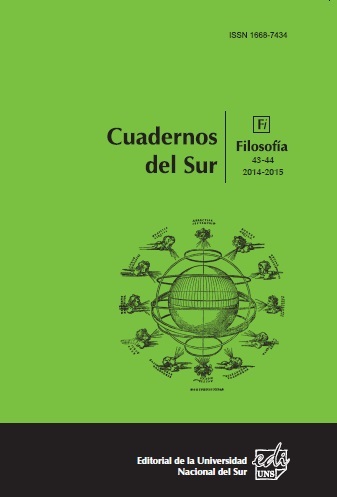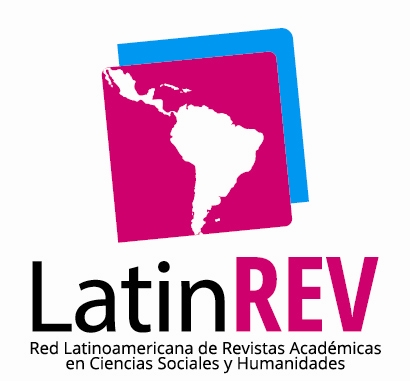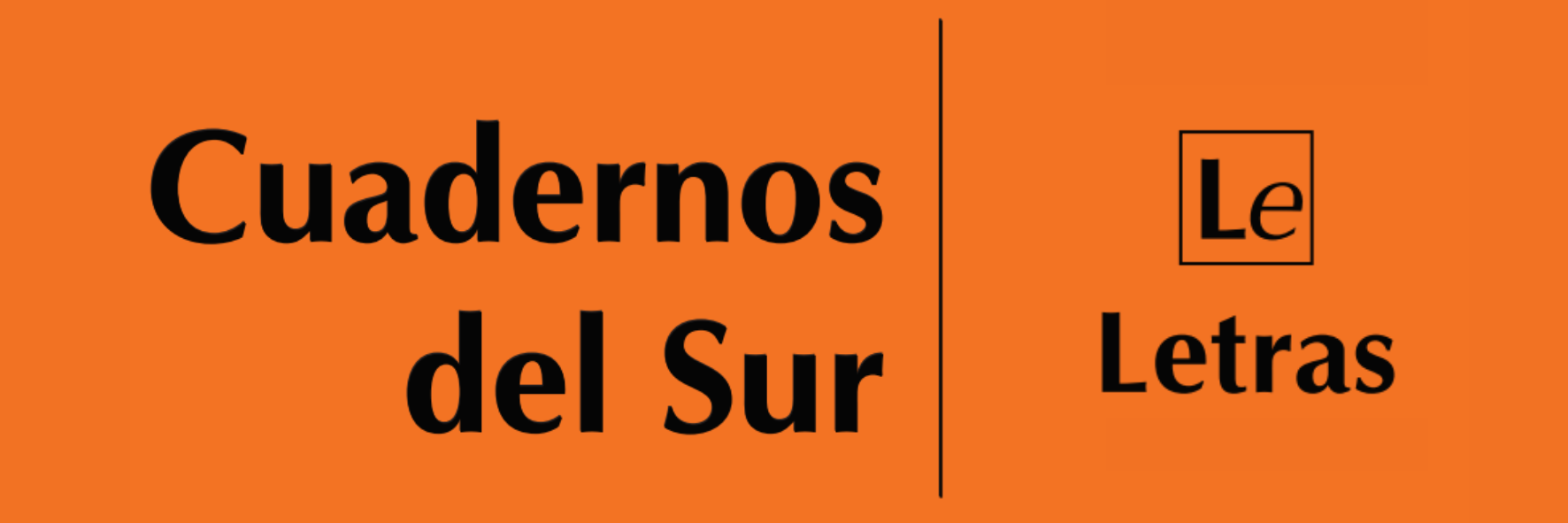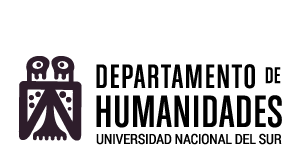Cartografía filosófico-política del ciberespacio: posturas extremas y moderadas
Keywords:
Cyber-Politics, Governance, IdeologiesAbstract
Information and communication technologies present new challenges for political theory and philosophy due to its large-scale and scope transformations. Their demands are refl ected in institutional needs that cover a “cyber-political” space, i.e., a cluster of problems of the governance of the network of networks –Internet– that results in the formation of new institutions –e.g.ICANN. The question I try to answer here is: What characterizes cyberspace political discourses? The proposed hypothesis is that it is possible to interpret the varied cyber-political positions from their relation with the actors that dispute cyberspace regulation. Taking this relationship as an Archimedean point, I distinguish between extreme positions –cyber-conservatism and cyber-libertarianism– and moderate positions –cyber-liberalism and cyber-socialism. Through the investigation of the works of the main proponents of each position (Goldsmith, Wu, Bar-low, Assange, Lessig, Barbrook and Filby) I try to show the modifi cations in the traditional political positions after the incorporation of the prefi x “cyber” and also, to highlight the benefits of the moderate positions over the extreme ones.
Downloads
References
Anderson, Chris (2009), Gratis: el futuro de un precio radical, Barcelona, Ediciones Urano.
Assange, Julian (2012), Cypherpunks: Freedom and the Future of the Internet, Nueva York, OR Books.
Barbrook, Richard (2000), “Cyber-Communism: How the Americans are Superseding Capitalism in Cyberspace”, Science as Culture, vol. 9, nº 1, pp. 5-40.
----- (2001), “HyperMedia Freedom”, en Ludlow, Peter (ed.), Crypto Anarchy, Cyberstates and Pirate Utopias, Cambridge (EE.UU.), The MIT Press, pp. 47-58, [1996].
Barbrook, Richard y Cameron, Andy (2001), “Californian Ideology”, en Ludlow, Peter (ed.), Crypto Anarchy, Cyberstates and Pirate Utopias, Cambridge (EE.UU.), The MIT Press, pp. 363-388, [1995].
Barlow, John Perry (2001), “A Declaration of the Independence of Cyberspace”, en Ludlow, Peter (ed.), Crypto Anarchy, Cyberstates and Pirate Utopias, Cambridge (EE.UU.), The MIT Press, pp. 27-30, [1996].
Belarte, Sabrina (2013), Economía del don: una utopía latente, Madrid, Editorial Académica Española.
Berners-Lee, Tim (2010), “Long Live the Web”, Scientifi c American, vol. 303, nº 6, pp. 80-85.
Busch, Otto von y Palmås, Karl (2006), Abstract Hacktivism: The Making of a Hacker Culture, Londres y Estanbul, Bitstream Vera-Lightning Source.
Cleland, Scott (2011), “In Defense of Rule of Law & ‘Cyber-Conservatism’”, Precursor Blog: Proven Thought Leadership, [disponible en: http://precursorblog.com/?q=content/in-defense-rule-law-cyber-conservatism - consultado el 4 de julio de 2014].
Dery, Mark (2001), “Bit Rot”, en Ludlow, Peter (ed.), Crypto Anarchy, Cyberstates and Pirate Utopias, Cambridge (EE.UU.), The MIT Press, pp. 389-399, [2000].
Filby, Michael (2008), “Together in Electric Dreams: Cyber Socialism, Utopia and the Creative Commons”, International Journal of Private Law, vol. 1, nº 1/2, pp. 94-109.
Ford, John M. (1980), Web of Angel, Nueva York, Pocket Books.
Gibson, William (1984), Neuromancer, Nueva York, Ace Books.
Goldsmith, Jack y Wu, Tim (2006), Who Controls the Internet? Illusions of a Borderless World. Nueva York, Oxford University Press.
Golumbia, David (2015), “Ciberlibertarismo: los fundamentos extremistas de la ‘libertad digital’”, Prometeica. Revista de Filosofía y Ciencias, nº 10, año IV, pp. 105-127.
Hall, Kira (1996), “Cyberfeminism”, en Herring, Susan (ed.), Computer-mediated Communication: Linguistic, Social, and Cross-cultural Perspectives, Amsterdam, John Benjamins, pp. 147-170.
Himanen, Pekka (2001), The Hacker Ethic and the Spirit of the Information Age, Nueva York, Random House Trade.
Hughes, Eric (2001), “A Cypherpunk’s Manifesto”, en Ludlow, Peter (ed.), Crypto Anarchy, Cyberstates and Pirate Utopias, Cambridge (EE.UU.), The MIT Press, pp. 81-84, [1993].
Lessig, Lawrence (2006), Code: version 2.0, Nueva York, Basic Books.
Martí, José Luis (2008), “Alguna precisión sobre las nuevas tecnologías y la democracia deliberativa y participativa”, IDP. Revista de Internet, Derecho y Política, nº 6, pp. 3-12.
May, Tim C. (2001), “The Crypto Anarchist Manifesto”, en Ludlow, Peter (ed.), Crypto Anarchy, Cyberstates and Pirate Utopias, Cambridge (EE.UU.), The MIT Press, pp. 61-64, [1992].
McLuhan, Marshall (2001), The Medium is the Massage, California, Gingko Press, [1967].
Millarch, Francisco (1998), “Net Ideologies: From Cyber-Liberalism to Cyber-Realism”, Cybersociology Magazine, nº 4, [disponible en http://www.cybersociology.com/fi les/4_millarch.html - consultado el 4 de julio de 2014].
Mueller, Milton L. (2006), “The New Cyber-Conservatism: Goldsmith/Wu and the Premature Triumphalism of the Territorial Nation-State. Review of Goldsmith and Wu’s Who Controls the Internet. Illusions of a Borderless World”, Internet Governance Project [disponible en http://www.internetgovernance.org/2006/05/01/6-2006-the-new-cyber-conservatism-goldsmithwu-and-thepremature-triumphalism-of-the-territorial-nation-state-a-review-of-goldsmith--and-wus-who-controls-the-internet-illusions-of-a-borderless-w/ - consultado el 4 de julio de 2014].
----- (2010), Networks and States: The Global Politics of Internet Governance, Cambridge (EE.UU.)-Londres, The MIT Press.
Raymond, Eric S. (2001), The Cathedral and the Bazaar: Musings on Linux and Open Source by an Accidental Revolutionary, edición revisada, Sebastopol (EEUU), O’Reilly & Associates.
Turner, Fred (2006), From Counterculture to Cyberculture: Stewart Brand, the Whole Earth Network, and the Rise of the Digital Utopianism, Chicago, The University of Chicago Press.
Vinge, Vernor (1981), True Names, Nueva York, Dell.
Downloads
How to Cite
Issue
Section
License
Copyright (c) 2014 Lucas E. Misseri

This work is licensed under a Creative Commons Attribution-NonCommercial 4.0 International License.
Aquellos autores/as que tengan publicaciones con esta revista, aceptan los términos siguientes:- Los autores/as conservarán sus derechos de autor y garantizarán a la revista el derecho de primera publicación de su obra, el cuál estará simultáneamente sujeto a la licencia Atribución-No Comercial 4.0 Internacional CC BY-NC 4.0.
- Los autores/as podrán adoptar otros acuerdos de licencia no exclusiva de distribución de la versión de la obra publicada (p. ej.: depositarla en un archivo telemático institucional o publicarla en un volumen monográfico) siempre que se indique la publicación inicial en esta revista.
- Se permite y recomienda a los autores/as difundir su obra a través de Internet (p. ej.: en archivos telemáticos institucionales o en su página web) una vez publicado su trabajo, lo cual puede producir intercambios interesantes y aumentar las citas de la obra publicada. (Véase El efecto del acceso abierto).














